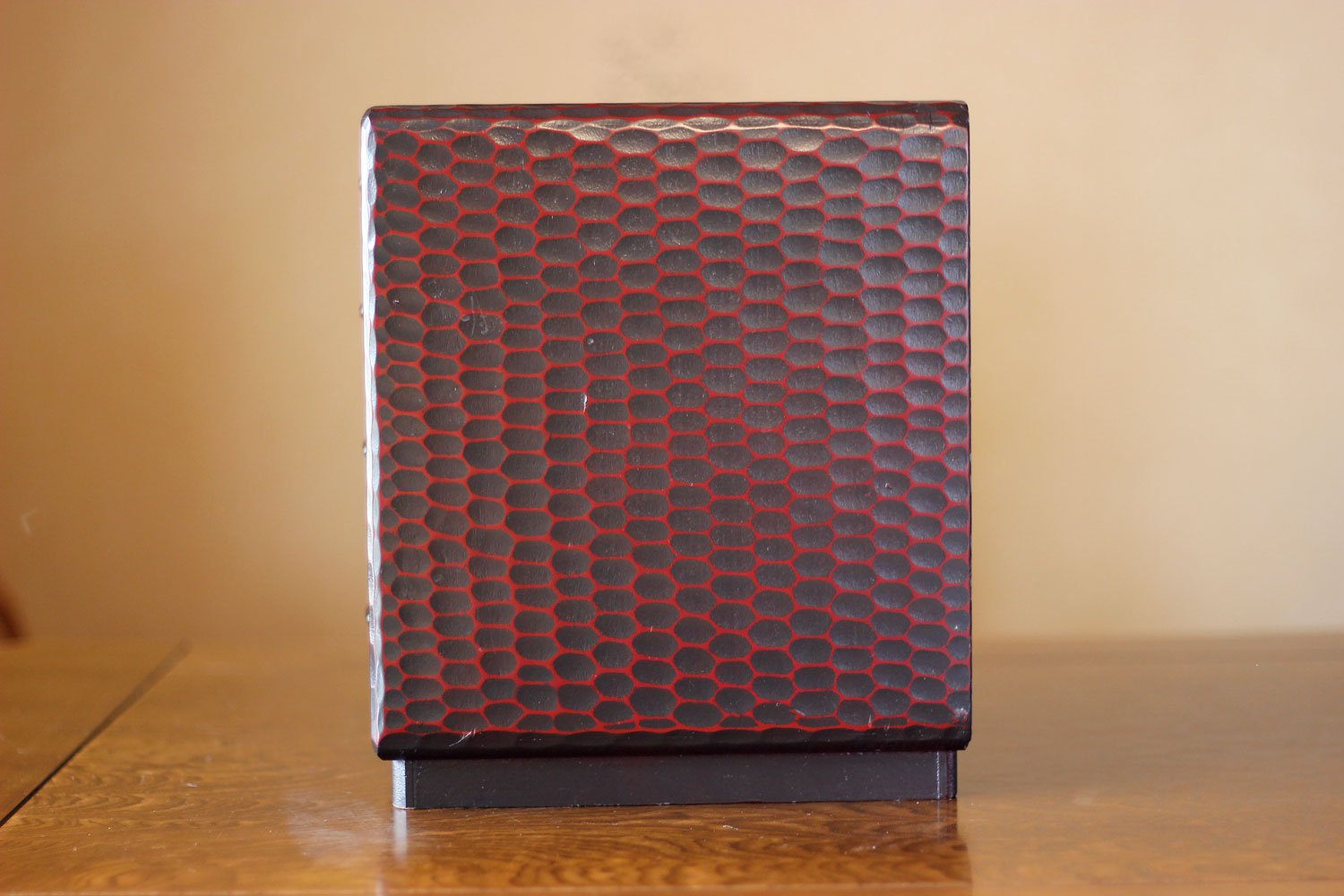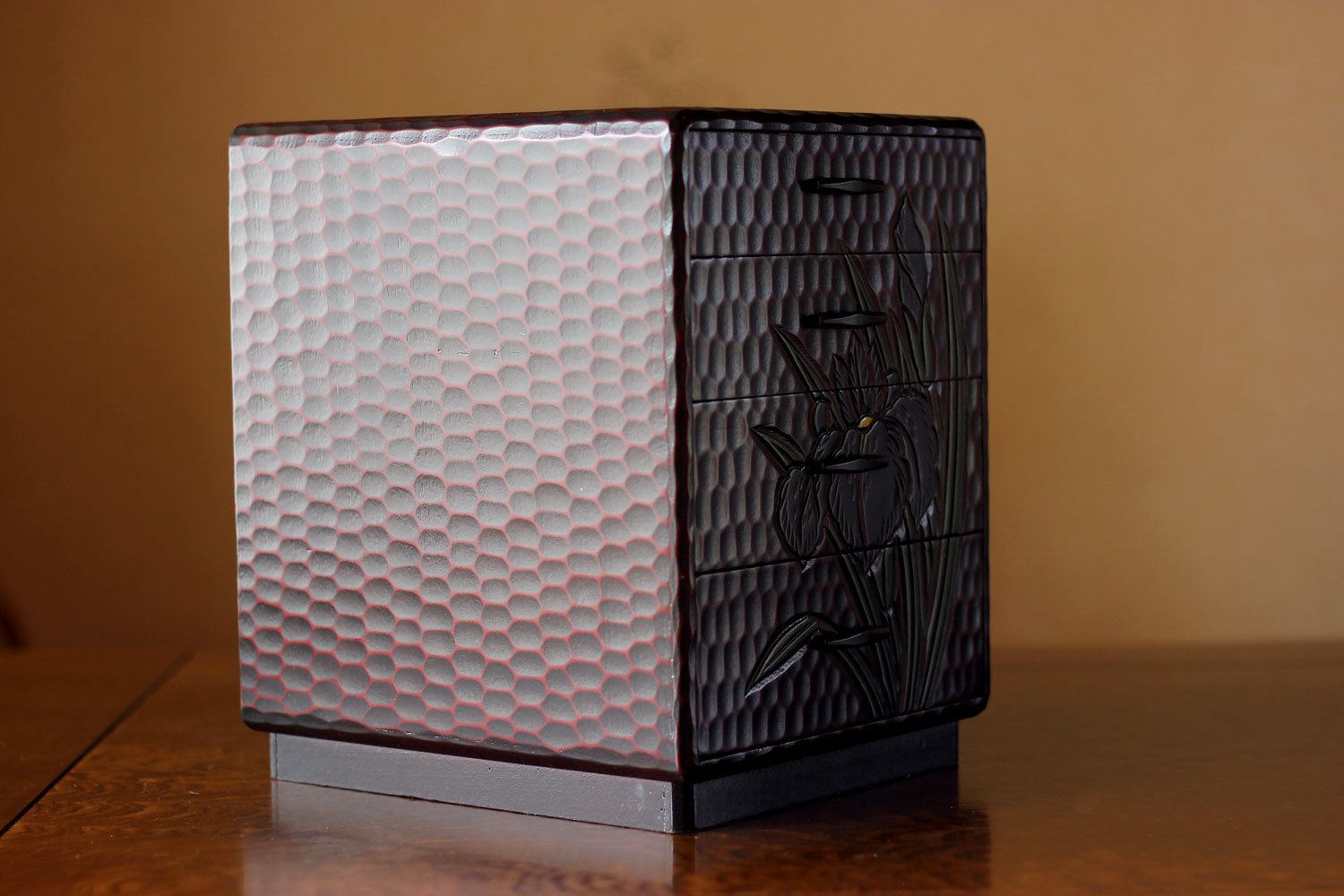Kamakura-bori mini chest - Iris (coloured)
Vintage item
Details
This vintage mini chest is hand-carved and covered with lacquer, following the traditional method of Kamakura-bori (read more about this craft at the bottom of the page).
It is made of 3 drawers. An Iris is engraved in the wood and is covered with blue and green painting. The text painted in gold at the back of the box tells us that it was a prize offered to someone called Kimiko Nagano in 1990.
Dimensions
hight 28,2 cm
width 22,5 cm
depth 23,8 cm
drawers hight from top one to bottom one: 4,9/5,7/7,7 cm
Conditions
Used, correct conditions. You can see on the photos that the box has a few small scratched on the front, side and at the top. Apart from these small defects here and there, there isn’t any damage to the object. Of course, the price takes these defects into consideration.
Made in Japan. Sourced in Miyazaki prefecture.
Vintage item
Details
This vintage mini chest is hand-carved and covered with lacquer, following the traditional method of Kamakura-bori (read more about this craft at the bottom of the page).
It is made of 3 drawers. An Iris is engraved in the wood and is covered with blue and green painting. The text painted in gold at the back of the box tells us that it was a prize offered to someone called Kimiko Nagano in 1990.
Dimensions
hight 28,2 cm
width 22,5 cm
depth 23,8 cm
drawers hight from top one to bottom one: 4,9/5,7/7,7 cm
Conditions
Used, correct conditions. You can see on the photos that the box has a few small scratched on the front, side and at the top. Apart from these small defects here and there, there isn’t any damage to the object. Of course, the price takes these defects into consideration.
Made in Japan. Sourced in Miyazaki prefecture.
Vintage item
Details
This vintage mini chest is hand-carved and covered with lacquer, following the traditional method of Kamakura-bori (read more about this craft at the bottom of the page).
It is made of 3 drawers. An Iris is engraved in the wood and is covered with blue and green painting. The text painted in gold at the back of the box tells us that it was a prize offered to someone called Kimiko Nagano in 1990.
Dimensions
hight 28,2 cm
width 22,5 cm
depth 23,8 cm
drawers hight from top one to bottom one: 4,9/5,7/7,7 cm
Conditions
Used, correct conditions. You can see on the photos that the box has a few small scratched on the front, side and at the top. Apart from these small defects here and there, there isn’t any damage to the object. Of course, the price takes these defects into consideration.
Made in Japan. Sourced in Miyazaki prefecture.
What is Kamakura-bori?
Short story
The origin of this technique goes back about 800 years. It consists of carving the wood before applying different layers of lacquer.
Kamakura-bori (鎌倉彫: litterally “Kamakura carving”) appeared in the Kamakura region during the period bearing the same name (Kamakura period, 1185-1336). It was born from the desire of Japanese artists to reinterpret the lacquer carving techniques imported from China at that time.
The Chinese objects they could observe were made by applying several layers of lacquer and then carving the patterns. To step away from the original sophisticated and busy style of the Chinese lacquer, it was decided to proceed otherwise and carve the wood first, before applying the lacquer. This way, the final render would look much more natural.
It is this final polishing that brings out the beauty of the patterns and textures.
Technique
There is usually a specific pattern carved on one area of the object. The pattern most commonly represents natural elements such as peonies or other flowers, or arabesques. The rest of the surface is carved in a seemingly coarser way, creating intentional chisel markings which give the Kamakura-bori its unique aesthetic. Several layers of lacquer are applied, and at the end, the surface is polished to slightly reveal the underneath layer. On the pattern area, we might even add black ink and rub the surface so it seeps into the fine lines and outlines of the pattern to make them stand out even more.
Lacquer is very slow to dry and needs the right heat and humidity to do so. Each layer must be applied on a perfectly dry surface so the whole process takes a long time to be completed.











